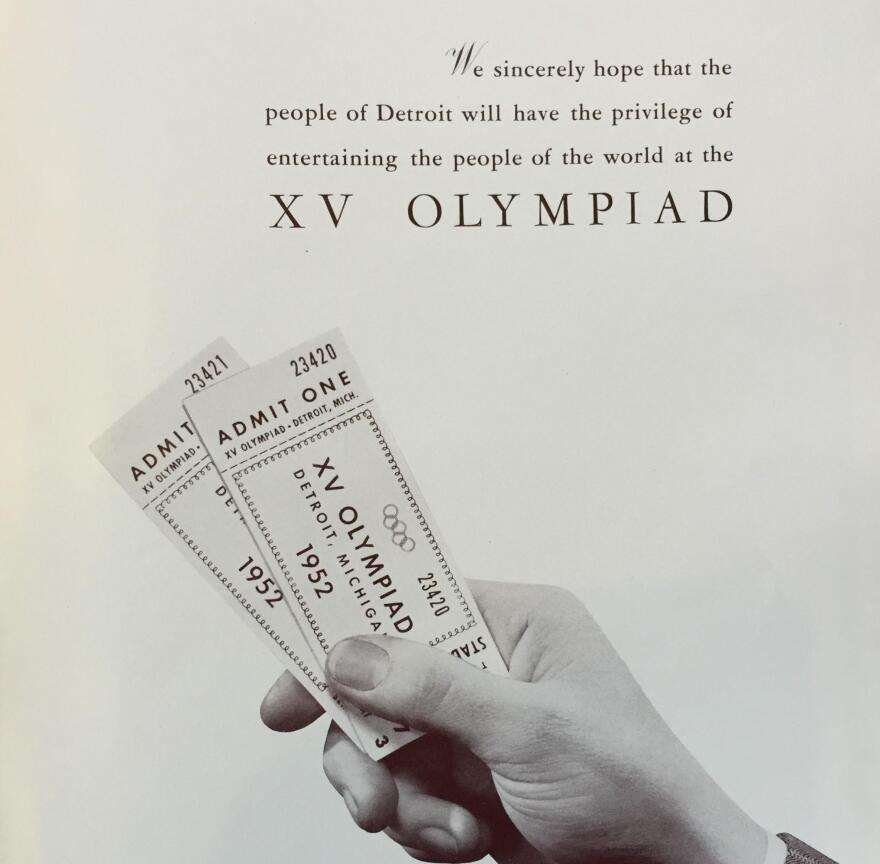After the Covid-19 pandemic postponed the event for a year, the Tokyo Olympic Games are set to begin on July 23. While the thrill of the athletic competition dazzles audiences from around the globe, the unseen process of who gets to host the games is just as competitive.
Detroit has submitted no less than seven bids to host, and expressed interest two additional times, but has never been selected. Dr. Stefan Szymanski, professor of sport management at the University of Michigan, created a virtual exhibit highlighting the city’s extensive history with the Olympic games--and the power of Olympic politics.
Detroit’s first Olympic bid took place in 1939, in the midst of the Great Depression. The economic conditions and general social malaise of the decade made the Olympics a beacon of hope.
“Detroit was hit harder than almost any other city in America by the Great Depression,” according to Szymanski. “And so they wanted to do something that would raise the spirits of the city and, you know, bring it to national and global attention.”
While this initial bid was rejected, the Olympic Committee assured Detroit that one day, it would have the opportunity to host.
“What they were promised was that if they got in line, one day, if they waited for all the cities that had prior claims, Detroit would get it.” Szymanski noted.
Detroit’s wealth, personality, and notoriety in the automobile industry made it a strong contender as an Olympic host city. Plus, it had a passionate University of Michigan alum, Fred Matthaei, leading the campaign to bring the games to the Motor City. Matthaei was particularly interested in amateur athletics, making the Olympics a perfect fit.
“The idea of, again, using the wealth that had been generated from industry to put it into sport and recreation,” said Szymanski.
But despite its many attractions, the city was repeatedly overlooked in the postwar period. The 1948 games were awarded to London following the devastation of the WWII Blitz. The 1952 games were held in Helsinki.
“The next bid came in 1949 for the 1956 Games, and Matthaei and Detroit were absolutely confident they were going to win this,” said Szymanski. The challenger? Five other states.
“This was before the IOC had a rule saying only one city per country could apply,” Szymanski explained. “And so the whole thing descended into chaos with five potential cities bidding for the United States...and they eventually just decided to give [the games] to Melbourne in Australia.”
With recent studies examining the rising costs of hosting the Olympic Games and expenses that seemingly outweigh the benefits, it is possible that Detroit dodged a bullet. Szymanski, an economist by profession, isn’t so sure.
“It’s not as if it couldn’t have afforded this and it wasn’t as if it didn't need new infrastructure...[Detroit] had not been beautified. The money had never been spent. And spending money on Olympic facilities that could have been reused might well have had a beneficial effect,” he said.
The politics of hosting the Olympics were not absent in Detroit’s being passed over. The issue of racism within the Olympic universe has been pushed to the forefront in recent days with Sha’Carri Richardson’s removal from the games, a ban on Black natural hair swimming caps, and the fact that no Olympic Games have been held in Africa.
Beyond the surface costs and addition of new stadiums, Szymanski said he wonders what would have happened in Detroit’s racial and political landscape if a bid had been accepted for the majority Black city.
“I think that it is in some ways one of the big ‘what ifs’ of Detroit’s history has to do with the failure...to win the right to host the 1968 Games,” he mused. “And the failure of that bid always makes you wonder what would have happened in 1967 in Detroit if they were twelve months away from hosting an Olympic Games.”
While the answer to this question will forever remain unknown, Szymanski believes that those bidding for Detroit missed an opportunity by ignoring the city’s black population.
“Had those organizing the bids engaged more fully with the Black community in the 1960s, then maybe the story of Detroit’s Olympic bids would have been different,” he said. “And maybe the story of racial tension in the city would also have been different.”
This post was written by Stateside production assistant Mary Claire Zauel.
Want to support reporting like this? Consider making a gift to Michigan Radio today.



